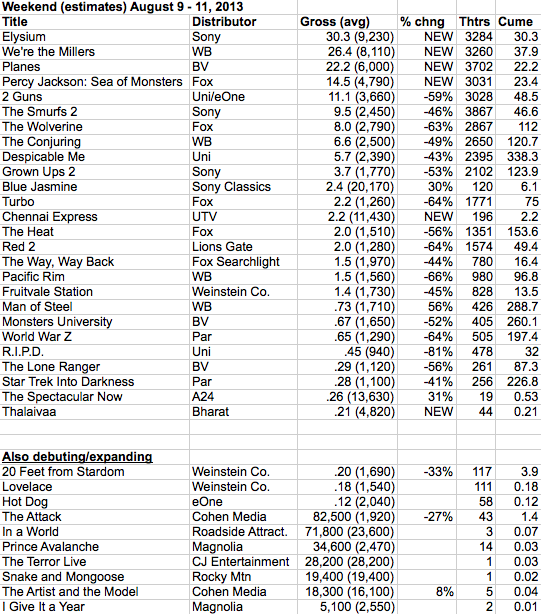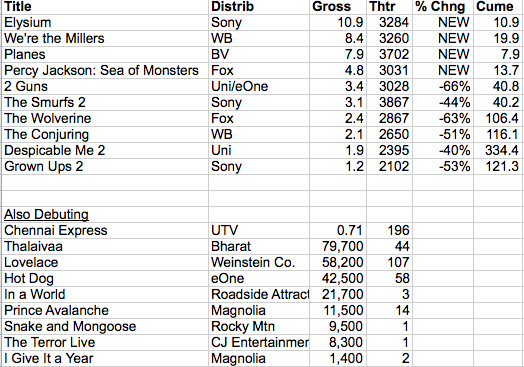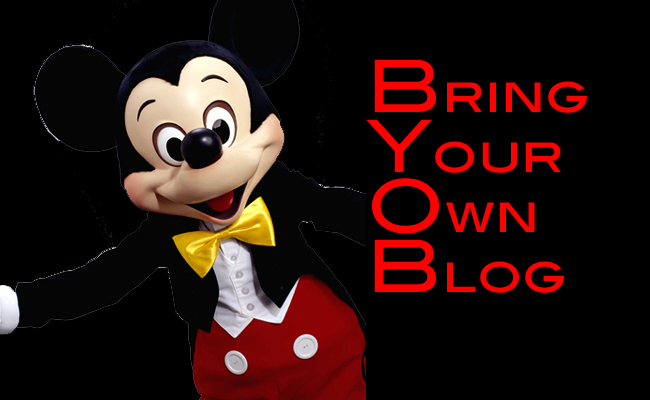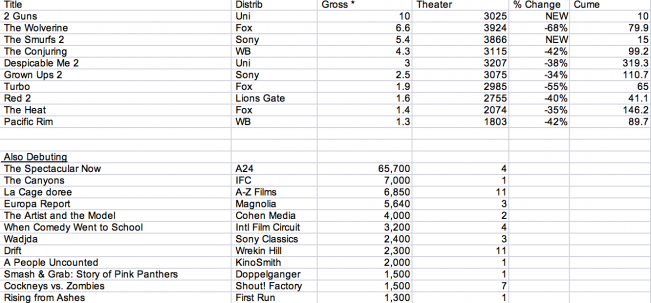The Hot Blog Archive for August, 2013
UnFree: There Is No Free Filmed Entertainment
I can get caught up in details when I start ranting on about how the movie and television business is moving into the future. But I thought of a less complex analysis of all of this – with plenty of footnotes I am not going to offer today – that might help some see the forest for the trees. (CBS/TWC is a tree. Netflix is a tree. Aereo is a tree.)
1. We Are The Infancy Of The Dominance of Internet Delivery of Content.
Realistically, we are about 3 years into the current era of streaming. Netflix began streaming limited films from its catalog in 2007. StarzPlay joined the streaming service in January 2008 for about $3 million a year. And on the TV side, Hulu launched in March 2008.
Going back a year, in 2007 Hollywood’s unions/guilds were threatening to strike for an extended period over streaming, having “lost” the fight to get paid fairly for DVD rights a decade earlier. The WGA struck in November 2007. DVD, which was supposed to be on the table, was quickly taken off the table. The AMPTP made the same argument for streaming that they had for DVD… that the tech was so young that there was no money and little money in the foreseeable future in streaming to pay the union members significant/fair residuals. The WGA settled in February 2008. The DGA also settled with AMPTP, without a strike, in February 2008.
SAG was the only union left with a threatening negotiation. There was talk of a strike or lockout before the formal agreement with AMPTP ended July 1, 2008. Didn’t happen. The union, suffering an enormous battle internally, worked without a deal for 11 months. A deal was finally ratified in June 2009.
Thirteen months later, July 2010, Netflix did its first big dollar deal with a content provider, Relativity Media, which was then distributing through other studios, but would start holding pay window rights for their product for Netflix. The deal was estimated by Relativity to be $100 million a year.
In the 3 years since the Relativity deal, Netflix has made a bunch of deals for streaming content with price points for major studio content using the Relativity deal as the North Star.
In these same three years, content owners of all scales have been analyzing, experimenting, and projecting the numbers on streaming opportunities.
2. Retransmission Fees Go From A Legal Possibility In 1992 To The New Normal Starting in 2009
There were retransmission skirmishes in the years since the law was changed in 1992 to allow broadcasters to negotiate retransmission fees if they so desired. But the first game-changing event was really in late 2009, when Time-Warner Cable and Fox TV network went to war. (Was it coincidental that Time Warner Cable had been separated from parent Time-Warner in March 2009? Probably not.) A deal was made on New Year’s Eve. Happy 2010!
Since then, we have all heard of repeated conflicts over retransmission fees. It’s not an occasional thing. If there is a major network/group of sites and a major cable/satellite provider, there is going to be a hot & heavy negotiation.
Every time it happens, it is treated like some anomaly by most of the media. But it’s neither an anomaly nor a surprise. It is, indeed, The New Normal.
3. Retransmission Fights & The Changing Face Of Streaming Subscriptions Are Rooted In The Same Thing
Pay me!
Pay me for every use, anytime, anywhere, any delivery system, and kind of receiving instrument… pay me!
There is this ongoing mythology perpetuated by a lot of media and a number of stock market analysts that there is a way to have this movement and end up with “free” content. But here is the bad news… free content is dead.
And here is the great news… content has become cheaper for consumers to access than ever since the cable era started and will only become cheaper.
We have learned, over and over, that there is some elasticity in the amount of money people will spend on entertainment in their homes…. but not endless elasticity. If the average cable/satellite bill is in the $80/month range, “average” families may be willing to go to $90/month. But when it gets past that, they will start slicing away at premium services… perhaps even cord cutting.
Households have accepted new monthly bills in the form of cell phones or home internet service, expanding their overall spend on “media.” But again… there is a glass ceiling on these spends.
CBS understands this. So does Time Warner Cable. And so do all the other companies. The only reason cable/satellite is unwilling to spend more or content providers are not asking for more is because they really can’t just pass the costs on to the consumer. There is a ceiling… and everyone selling wants to force the buyers as close to it as possible, while the buyers want to be as far away from it as possible (aka making more profit).
Still, no one, on any side, wants to give anything away for free. None of this is a negotiation of philosophy – and much of the media wants it to be – but simply of the price for everything being set by the marketplace.
If you believe Netflix claims that they are tailoring content to the stuff that people like best, you might want to take a look at the Brooklyn Bridge. I’ll give you my PayPal account number and you can just transfer however much you think it’s worth. Netflix, like Time Warner Cable, like CBS (as they buy content from production companies) has a limited amount to spend.
If every major studio was willing to sell content to stream on Netflix for a couple million dollars a year, as was the deal with Starz just 5 years ago, Netflix would be streaming every piece of content on the planet and making money hand over fist. And let me note… the companies getting paid out on StarzPlay were thrilled with the additional revenue. Thrilled! But in 3 years, that price point has grown exponentially. Starz was two studios, Sony and Disney. The new deal between Netflix and Disney is for $350m a year. That’s one studio, albeit with more TV product in the deal and with exclusivity. But still, ONE studio.
4. On The Other Hand…
A $350 million annual streaming deal doesn’t begin to replace the revenue that evaporated from the crash of the DVD business for any studio. And the pain of the dying of the DVD light is equally bad if not worse on the TV side.
So with the assumption that the big pot o’ home entertainment spending is not going to expand without a new, successful must-have product, how will the studios make up for the loss?
Retransmission fees are part of making up that lost revenue.
But to my eye, the biggest change we can expect in the next 5 years is a reconfiguration of “premium” packages and subscription content. The cap on the number of households in the TV universe choosing to subscribe for any premium service/subscription is still under 40 million households in a cable/satellite universe of about 110 million. The economics for content providers demands that the number of subs be a lot closer to the 110 million mark.
If CBS gets $2 a month for the network on 110 million cable/satellite boxes, $2.64 billion dollars a year. That’s beginning to be real money. CBS’ annual revenues are about $15b a year now. Earnings are about 10% of that. And they are the top network right now.
For reference, ESPN is charging $5/mo to some cable/satellite companies… if 110 million households were paying that, that’s $6.6 billion.
5. We Are Experiencing The Growing Pains Of Transition, Not The Final Product
If you’re the owner of a cable company and for 25 years of the 30 you have been in business, you have been forced to carry the broadcast networks and all local stations as part of your contract with each municipality, and all of a sudden (last few years) you are being asked to pay 24 bucks a year for CBS, which inevitably would mean paying no less than $7 a month/$84 a year just to show the broadcast networks (which your subscribers have considered basic cable for decades), it is understandably shocking.
But you didn’t get and then lose all that DVD revenue. You aren’t sweating out the ratings of your shows and thus, the advertising dollars, some of which are moving to cable stations that your broadcast network carried for years so they can now take advantage of with new, fresh, costly programming. You aren’t sweating out the post-first-run release to streaming and estimating how much revenue that will ever produce.
It’s easy to say “a plague on both houses.” But not so easy to be glib if you are running a multi-billion dollar business with 15% margins at the very best, the threat to lose money at the worst, and a big transition in revenue streams.
Some part(s) of the food chain will get hurt in all of this… and potentially hurt very badly. And we are just at the beginning of the massive, violent, vicious scrum that will determine who wins and who loses. The winners may not be as strong as they imagine “winning” should leave them. The losers may expand into other businesses that will be more successful than they would have been had they just been able to stay the course.
But not being able to see “Under The Dome” for a month of episodes is collateral damage… and minor damage at that. It’s the traffic you have to sit in when the city is expanding the road you drive to work on every day. It sucks. It’s unfair. It may force you to sleep less in order to get to work on time. But when the road is done and you can get to work faster every day for many years to come… you forget.
Or how about this analogy… remember when they tore up your street to put in the cable? Or when you were infuriated by having to wait home all day to get a cable installation?
In five years, when real change settles in – and settles in for a lot higher percentage of Americans than are currently considering what content they can get on their iPads or on VOD – all of this will seem like a small price.
And if you are still caught up on the ides that there will be some nirvana in which the average American household will pay $40 a month and be happy to get the cord-cut-content that’s available for that… well, enjoy your fantasy. The rest of us will be over here, still paying $80/month or $100/month or whatever and trying to figure out how to consume a bucket of content of greater depth and breadth than was ever available for eat relatively inexpensive access in the history of mankind. (Kinda like now… but a lot better… just not cheaper… and certainly not “FREE!”)
7 Comments »Weekend Estimates by 4X Klady
Elysium did just about okay. I am a big fan of the film, but as has become a bad trend for a number of big studio films this summer, Sony left the ladies hanging out at home while the boys hit the multiplex. (61% male audience, according to Sony.) Oops. You want a theory about this summer’s openings that I haven’t seen trotted out (and which I consider a marketing issue, not a production issue)… one after another, the disappointing openings have been utterly lacking in any draw for women. Some films, like Pacific Rim and White House Down, had a major girl storyline and just didn’t sell them. Others, like After Earth, The Lone Ranger, and The Internship, never hinted that women were in the movies at all. And Elysium, which featured Jodie Foster in both the film and the advertising, still seemed to put the exoskeleton ahead of the love interest, though to be fair—and horrified—the love interest is beige and therefore perhaps off-putting to a portion of America’s core audience for the film. (To be clear, I do not think the film is about rich white people vs poor brown people… but I will be going back to make sure that I am not misguided in this view after hearing some complaining about it by a Pulitzer winner.)
Warner Bros owns the comedy slot on the second weekend of August. We’re The Millers did almost exactly what The Campaign did in that slot last year. Last year’s film topped out at $87m domestic. But without the political theme and the more physical comedy, I expect that WB is hoping for a much better result internationally than Campaign had ($18m).
Planes is an effort from a division of Disney Animation called DisneyToon Studios. It’s kind of the farm team for Walt Disney Animation Studios and, presumably, for some future Pixar employees. (One boss rules them all.) Most of the films with a 2 or 3 after them are being pumped out by the very talented people at DisneyToon Studios and somewhere during the pipeline, a decision is made to do theatrical (internationally or domestically) for some of these films and direct-to-DVD for others. As far as I can tell, Planes is the first full-out domestic theatrical coming from this division. The Tinkerbell/Fairies series was at one point earmarked for theatrical and at least one was released theatrically in international. But brave new world with this extension of the Cars universe. And a $22.5m opening against the announced $50m production budget, given the nature of animation multiples and the potential internationally, suggests that this can be a solid profit-maker for the studio. So it’s not a home run… but it could be a triple, financially. (And with Disney, one must never forget the non-film ancillaries, in this case, offering a whole new area of toys that the studio really hasn’t sold before…airplanes.)
Percy Jackson: Sea of Are We Really Doing This Again is the latest soft kick-off sequel. The first film of the franchise did only $227m worldwide, which with a near-$100m budget, was just enough to get out of red ink when all markets, theatrical and post-theatrical, were exploited. But the notion is that international will leap when the 2nd big CG action film in a franchise arrives. So with Dune’s dollars in addition to whatever they have in it, Fox went forward with the sequel and the answer, domestically, is “oops.” The opening 3-day is about half of the first film’s. Even a more lenient read, comparing this film’s 5-day to the first’s 3-day, has the number through the first weekend off by 25%. But the big international push awaits.
Not a lot of great interest in the holdovers. The Wolverine is holding better than some may have expected and it may well get out of the cellar of X-Men grossers, still with a shot to pass X:Men First Class. Fox is betting the farm on next summers X:Men: Days of Future Past, so they must be a little nervous that this higher quality Wolverine didn’t do better. They’ll light candles to the memory of Batman Begins leading to The Dark Knight many times in the next 10 months.
Nice expansion for Blue Jasmine. The film has already grossed more than most of the Woody “disappointments.” The step into the teens is inevitable. But the real high bar for Woody Allen grosses is $20 million, which only seven of his films have reached in the past. This looks like it can get there too. And who knows what the upside is? Only four Woody films have passed $24m. So anything over that has to be considered a big win, even if we’re not looking at a challenge to Paris.
Pacific Rim is now over $200m internationally before Japan’s opening this weekend. It will gross well over double what any other Guillermo del Toro film has ever grossed worldwide. Of course, price tags change expectations. But near $300m and still growing, the film is now praying to be break-even. There’s even talk of a soft kick-off sequel.
In A World… has a nice 3-screen opening, while Lovelace‘s opening on 111 screens—VOD threatening to arrive any second—kinda sucked.
23 Comments »Review: The Butler
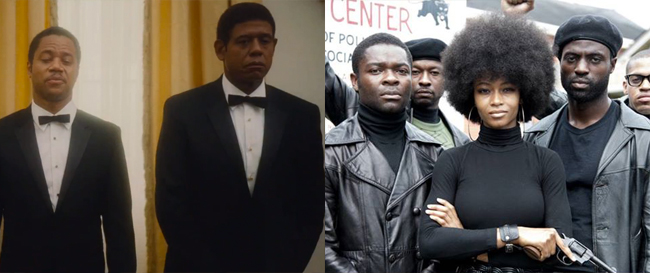
The Butler is a good movie. It is not quite a great movie.
Why?
The movie of the title is about a man who was born a sharecropper, who, after suffering a tragedy born of racial dehumanization, is shown a “kindness” by the materfamilias of the plantation, and is taught to be a “house nigger.” He takes his skill set north (cotton and serving) and eventually ends up at the White House. He serves with skill and decorum over many, many years, most of which are also the years of the Civil Rights Movement in America. We meet familiar Presidents and First Ladies played by celebrities, all of whom do better than you would expect… quite well. Oprah is solid and occasionally strong. Excellent supporting cast (this film makes one miss seeing Cuba Gooding, Jr. more often). And Forest Whitaker gives a truly great performance that instructs us that his range as an actor is a wide as anyone acting today. Lee Daniels shows the most restraint as a director we have seen and delivers an altogether likeable, heartfelt, stirring film.
So. What’s the problem?
Well, there’s this other movie in The Butler. It’s about a father and a son. The father is the first independent man in his family and has had a legitimate success in his life. His son, benefiting from that success, doesn’t understand the brutal journey that his father took. As the Civil Rights Movement happens, the son feel compelled to participate, regardless of the risk to himself (or, for that matter, his family and/or his father’s government job). In many ways, the father’s idea of progress is Martin Luther King and his son’s is more on the Malcolm X side of the argument. So this tears them apart. The son has a knack for being the Forrest Gump of Civil Rights, just as his father has to direct access to the American most likely to be a part of history (the President).
I would have liked that movie, too. Beyond the genius performance of Forest Whitaker and the effective directorial recreation of history by Daniels, the performance by David Oyelowo as the son is strong and supporting work by recovered model Yaya Alafia, as a classmate turned comrade, and Elijah Kelley (who you may remember as Seaweed in Hairspray) as the other (goofier) Gaines brother is terrific. And of course there is my favorite cameo in concept… Nelsan Ellis—best known as Lafayette from “True Blood”—as Martin Luther King, Jr.
The problem I have is that the two films— both of which were legitimate, interesting choices—don’t come together to the benefit of either angle on this story. The Civil Rights movement is a critical part of Cecil Gaines’ White House story. Like so many of his generation, he managed to assimilate and didn’t want to rock the boat by reasserting his pre-slavery cultural identity. This is not just an American slavery thing, but one seen in the first arriving generation of most cultures in this country.
But as the first act of the film moves through the Eisenhower administration as The Cecil Gaines Story, in the second act, it becomes Cecil & Son… really Son & Cecil, because son’s story is much more raw and emotional and the movie never quite finds the dramatic place where these two very powerful stories really connect.
By the time you get to the third act, the disconnect of philosophies has become a personal battle. And again, interesting and well done enough. But I didn’t feel like I was seeing the deep, personal battle within Black America to decide what the right answer for the race, as a culture in America would be. This was so clearly defined by the philosophies of King & X. But not completely by coincidence, I don’t imagine, Malcolm X is barely mentioned in the film—even amidst a long hunk of Black Panther conversations—while King is not only a character in the film, but one with whom Gaines The Younger travels in the south.
Ultimately, The Butler is a King-siding film. There is even a very effective moment in which King argues for the importance of Black domestic workers in the rise of Black culture in America. And that’s all good. But the lack of a legitimate voice for the X side of it all undercuts the drama the so dominates the movie for about a third of the film.
Somehow, some way, the importance of the subject, especially as embodied by the younger Gaines, requires a clear addressing involving the older Gaines. Emotional movement happens, but again, it is personal, not about the philosophy of the core subject. I am not telling the filmmakers how to do this. There are many ways to keep the cultural context as the clear theme of the film without discussing it overtly (see The Godfather, Rocky, Halloween, Up, Lawrence of Arabia, Silver Linings Playbook, and thousands of other good and great films). But if you are going to push an idea as hard as The Butler does civil rights, it seems nearly impossible to be great and not to engage the central character in either direct embrace or denial of that central idea.
This is not, as I see it, a case of “this film differed from my expectations.” What few expectations I had, it surpassed. And I am as much a sucker for the last scenes of the film as anyone. But good or even great scenes are not enough to be great. The thematic whole of the film must work. And for me, the “other movie” in this movie is much more serious, much more layered, much more about arguing the issues in a real way. When a character from the Cecil Gaines part of the film notes that the son, Louis, is in jail for the tenth time or whatever the number is, that’s reminding me not of how serious his story is, but rather how not serious the film is about telling that story.
Thing is, Forrest Gump—and in so many ways, this is Black Gump—understood that laying too heavily on any part of history would upset the balance of the film. That is not to say that Gump is the standard by which all movies must conform. Not at all. But it was very smart about this particular trick.
The other odd Gump comparison is Cecil Gaines himself, who is beautifully measured and real, but an emotional cypher close to Gump and his mental “disconnection.” We do see Cecil having emotions, but almost all personal ones. How is his son, and how much is the Black staff at the White House getting paid? We never know how he feels about King or X or any of that outside of the prism of his work. And even the idea, which is broached softly, that he doesn’t offer personal opinions because it is his job not to, would be fine… if this was just that Cecil Gaines movie that touched on history, but didn’t wade in as deeply as this film does.
That’s really it. There are other nits I could pick, but the film is better than that. In fact, it is good enough to hold only this one thing against it. But that one thing did keep the movie from being truly great. At least, for me.
One last note… I think it would be a nasty thing to blame this disconnect I feel on the idea that this film is pandering for awards. I do not think that and I think it is offensive to suggest. I think the writer and director and perhaps Harvey Weinstein were trying to pull off a near-impossible magic trick. That is what I think the intention was… to mix and reflect between the two sides of the issue while not taking sides. (But the film does, really, take sides.) I don’t know what the awards future for this film will be, aside from a 99% sure nomination for Forest Whitaker. But the movie did not make me feel for minute—even as the last 10 minutes milked recent history pretty good—that there were any ambitions other than artistic ones driving these choices.
22 Comments »DP/30 Sneak: Austenland (Jerusha Hess, Keri Russell, Jane Seymour, Georgia King) on Jennifer Coolidge
Weekend Estimates by 2 Gun Klady
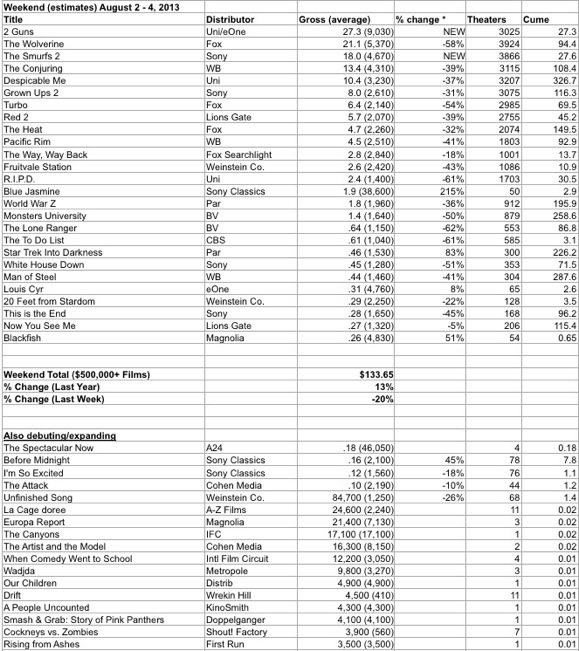
2 Guns is a good opening for Wahlberg or a good opening for Denzel. There was no noticeable bump coming from teaming the two solid openers. However, Denzel’s international history shows bigger numbers when he’s teamed with a white guy… so there may be a payoff there.
The film is a reasonable and often mis-structured piece of studio b-movie making… not as good as, say, Timecop, but with shiny objects dropped around, like Paula Patton shot to benefit every curve or Edward James Olmos getting hit in the face a lot or lots of stuff blowin’ up real good.
2 Smurfs (the Asian way of saying it) is looking to the rest of the world to make up for American disinterest in any more blue smurfing animation… and will get away with it.
The Wolverine will become the 15th $100m domestic grosser of the summer this week.
0 Grown Ups/2 Movies will be another solid hit for Mr Sandler. Expect a wave of “Sandler Is Back!” stories from adoring critics. (heh heh)
Very strong opening for The Spectacular Now (as usual, don’t assume that it will extrapolate to big wide grosses… though I would love that). Also, continued muscle by Blue Jasmine, now on 50 screens.
130 Comments »31 Weeks To Oscar: Ellen DeGeneres, Oscar Host
So… Ellen DeGeneres is back hosting the Oscars.
And let the yawning begin.
I liked DeGeneres as an Oscar host. She didn’t absolutely kill, but she didn’t die. She is a little tiny bit edgy, but knows her role in the evening. There won’t be a 15 minute musical number about Ellen opening the show, though I would be surprised if there isn’t a joke about McFarlane’s boob opening of last year.
But there are two stories coming out of this.
1. This is a completely vanilla choice. It is not another attempt to pander to a younger demographic, as McFarlane was (and though people keep talking about the ratings bump, it was so small that its significance is overstated). It is not a choice that will be a big story all fall. There are 3 or 4 others who could have been equally capable of doing the job and not causing a stir.
2. This was one last move made by Dawn Hudson and her team to undermine the power of the new Academy president, Cheryl Boone Isaacs.
When were show producers Zaden & Meron announced last year? August 23. This year, April 16.
When was host McFarlane announced last year? October 1. This year, the announcement was on August 2.
Why? Because current leadership, knowing that now-former Academy president Hawk Koch could not be re-elected, decided to make the producer decision without a sign-off from the new Academy president, as has been the norm. Last year, when Hawk Koch took over the presidency from Tom Sherak, the producer was announced August 4, six days after Koch took over. He could have, if he sought to do so, vetoed the choice before it was announced. And when Tom Sherak took over as president in 2009, the producers (Mechanic/Shankman) were announced August 23 and the hosts (Steve Martin & Alec Baldwin) were announced in November.
I am not suggesting that Cheryl Boone Isaacs is against Ellen DeDegenres hosting. And it is likely that the choice was presented to her on Tuesday night or even earlier.
But obviously, producers Meron & Zaden had this cooking for some time before the presidential election on Tuesday. And for the new president to say “no” to any host, especially one as pleasant and nonabrasive as this one, would be argued to be stopping things just for sport… especially with no alternative in place or perhaps even, in mind. A silent stand-off.
So… in end… I am cool with Ms D hosting. But I don’t think the move to safety was about the show much at all. I’d say it was a safe move from and for Academy insiders, who have made some choices in the last 18 months that have been unpopular with many members over 60, at a time when the president is no longer a rubber stamp.
I would love to see the administrative side of the Academy and the new president work together in a respectful way that will grow The Academy as an organization that supports film history and culture, as well as a brand, which pays for all their good deeds. Hiring Ellen DeGeneres is a fine thing. But the timing is not encouraging.
13 Comments »This Year’s Bullshit Myth: Originals Can’t Launch
Every summer, some stupid Chicken Little meme takes hold of the Hollywood press (which tends to be 100x less original than “Hollywood”). This year’s BS is “it’s impossible to launch an original idea in the current atmosphere.”
I know that it is too much to ask of, ahem, journalists, to do a lick of research. It’s much easier to get studio execs scrambling for excuses after a failure to tell us all the honest truth of the situation… it’s the marketplace! It’s never the marketing, the film, or the simple arrogance of making too many movies that are required to hit the bulls eye in order not to fail.
DID YOU KNOW that 10 of last summer’s Top 20 domestic grossers were, for all intents and purposes, original:
Brave
Ted
Snow White and the Huntsman
Prometheus
Magic Mike
The Campaign
Dark Shadows
Battleship
Hope Springs
The Dictator
You want to take Prometheus out? Okay. Snow White? Did 2.5x what Mirror Mirror did domestically and was a dramatically different take on Snow White. But okay. Dark Shadows is pretty iffy as a “remake.” But if you need to make that non-original, okay. So, 7 of 20.
What about the now infamous international market? The list is different. And I am working with the numbers for the whole year here, not just summer, as the dating issue makes a direct comparison almost impossible. That said, there isn’t an original in the Top 8, but even in international, it’s 9 originals out of 20 or 7 if you eliminate the titles we eliminated in domestic.
The Hunger Games
Life of Pi
Ted
Brave
Wreck-It Ralph
The Intouchables
Django Unchained
Prometheus
Snow White and the Huntsman
Funny… it seems to me that the international tastes for originals is more interesting than the domestic.
Using the entirety of 2012 for the domestic market, it’s still 7 or 8 of the Top 20 that are originals:
Brave
Ted
Dr. Seuss’ The Lorax
Wreck-It Ralph
Lincoln
Django Unchained
Snow White and the Huntsman
Hotel Transylvania
NOW… I do not dispute at all that there is a lack of originality in Hollywood’s thinking. The reasons are 85% financial and 15% it’s hard to come up with new ideas that have the potential to be special.
And it is more than fair to notice the number of animated films that are on these lists.
However, it is unfair to discount original animated films just because they are animated.
And for those who obsess on this stuff (desperate for a fresh angle, even if inaccurate), 2011 was much worse than 2013 in terns of originals. None on the Top 9 domestically. The first, at #10, was Thor. The entire list of 7 that are in the Top 20 is:
Thor
Captain America
The Help
Bridesmaids
Puss In Boot
Rio
The Smurfs
Of course, it would be unfair to claim that a new film from a different market (comic books, nursery rhymes) was not an original, but if you did, you’re down to 2 films.
BUT WAIT! I haven’t gotten to the reason why this meme is even more stupid this summer. Here is the list of originals from this summer’s Top 20 grossers:
World War Z
The Great Gatsby
The Heat
Now You See Me
Epic
This is the End
The Conjuring
Pacific Rim
The Lone Ranger
White House Down
The Purge
That’s ELEVEN of the Top 20 this summer so far. More originals than any year in recent memory.
Oh wait! You’ll give up the originals argument and this is just about launching new franchises? Okay. Well played.
And if The Lone Ranger had been made by people who didn’t act like there were no limitations – oh, the irony – it probably would have been a lot more fun (lots of serious talent involved) and made a lot more money. But I can’t claim to know that… any more than anyone can claim its failure was because it wasn’t a sequel.
But really, the whole obsessiveness of this nouveau meme is that 4 very expensive movies bombed. And even that is relative, as Pacific Rim and After Earth are both over $200m ww, and The Lone Ranger will get there.
Here is the simple money math. Since 2007, which is the first time there were more than six $500m ww movies in a year, the number’s been at 8 or better. In 2011, just two years ago, the number of $500m ww movies went to double digits for the first time, with 12. Last year, it was 13. This year, 6 so far, with 3 coming within $50 million (Oz, WWZ, Trek). If those three films performed just a little better, we’d be on track with last year. They didn’t and we will probably fall back to 11 or 12 $500m ww grossers this year.
In other words, the “failures” are not so shocking when you realize that the “successes” are not too far off “best ever” status. The market is flexible and does accommodate growth. But if you are choosing to be in the $200m+ movie business and the market is as crowded as it was this summer, someone’s gonna bleed. And in terms of the media analysis, the serious blood all started flowing this year after 6 weeks of more successful films bored everyone out of their skulls, so that’s all anyone seems to want to write about.
This is a terrible business in which to generalize, as each movie is its own unique business. $212m makes a cash cow of Now You See Me and a carwreck of Pacific Rim. And if you talk to anyone about those two movies, they get it. Not saying people are dumb. But when they seek a theme for the summer, suddenly the specifics of each movie get blurry.
Seven or eight years ago, I would write that if certain movies needed to make $400 million worldwide to make money, a studio should only be taking one, maybe two shots a year at that. Since then, the worldwide market has expanded… and the DVD market has contracted wildly. Marketing costs have not contracted significantly (but they have a little and not expanded, except for expanding international markets), but the $190m-210m behemoths that were getting made recklessly are now $250m+ behemoths. The math on the theatrical alone has actually improved a little for those films, but the DVD drop outweighs the marginal growth in big box office… generally.
Many people are looking – always – for a reason to say, “Hollywood sucks” aka “Hollywood hates originality” aka “Hollywood is stupid” aka “Make more movies that I like.” And there is some truth to all of these memes… and a lot of untruth. What is the #1 driver of media’s anger at Hollywood these days, in my opinion? The age of the authors. Even going back to the “golden age” of the late 60s and early 70s, were those “movies for adults” or just smarter movies that were fine for adults but were really for the hipsters of the era. Easy Rider was rebellion, not “adult.” Movies were (generally) about sex and violence and anger and politics all the things the 1950s squeezed out of the movie universe. But then, as now, these films were for young people. And we were young and so as we aged, they were still for us. But none of the critics today who love the 70s movies were in their 50s in 1974. The films that override this are the great films and will last forever, for all ages over 15.
The Top Grossers – by year – of the 1970s (via Wikipedia):
1970: Love Story (1970)
1971: Billy Jack (1971), or Diamonds Are Forever (1971)
1972: The Godfather (1972)
1973: The Exorcist (1973), or The Sting (1973)
1974: Blazing Saddles (1974), or The Towering Inferno (1974)
1975: Jaws (1975), or The Rocky Horror Picture Show (1975)
1976: Rocky (1976)
1977: Star Wars (1977), or Close Encounters of the Third Kind (1977/80), or Smokey and the Bandit (1977)
1978: Grease (1978), or National Lampoon’s Animal House (1978), or Superman (1978)
1979: Kramer vs. Kramer (1979), or Rocky II (1979), or Moonraker (1979)
These are the movies I grew up on. Love almost all of them. But the exception of The Godfather (one of the all-timers) and Kramer vs Kramer, do you see a lot of “adult” movies? I would certainly agree that there were more dramas being made by the studios. But that’s a whole other conversation. (Notice also… only 2 or 3 movies with female leads or co-leads.)
There is no question. CG has changed the movie world and driven a lot of action movies that were less viable – because of disbelief issues – in the past. (We still have to suspend disbelief in a big way, but… another conversation.) But every studio is still chasing the same thing. And audiences are still going to the movies. Studios just have lost track of how to balance a slate.
Next summer will look completely different than last summer. But as we get a new Godzilla and a Spider-Man reboot sequel and a re-reboot of X-Men leading the way in May, let’s look back to the summer of the last new Godzilla in 1998.
There was a Doctor Dolittle reboot, a Zorro reboot, a remake of The Parent Trap, a film of the TV show The X-Files, a film of the TV show The Avengers, a reboot of Cinderella, a reboot of Halloween, the last Lethal sequel, a film of the comic book Blade, and even a version of Les Mis.
There was also Saving Private Ryan, leading the box office. And that is different. That would probably be a fall movie these days. The #2 movie, Armageddon? Pretty much could be released in 2013 with some added CG. There was also There’s Something About Mary… and next May, an R-rated Seth MacFarlane western comedy.
The sky isn’t falling. We just remember it looking prettier.
38 Comments »





